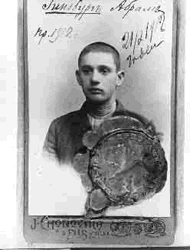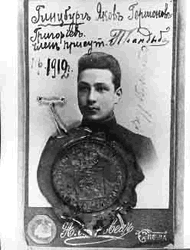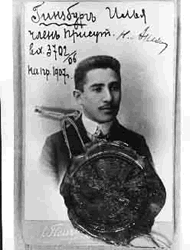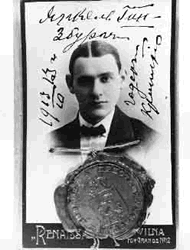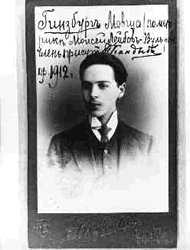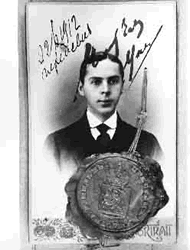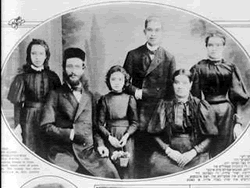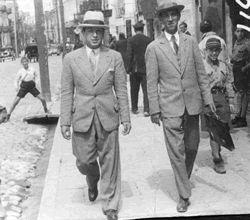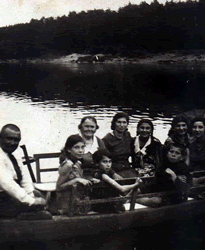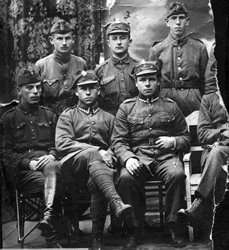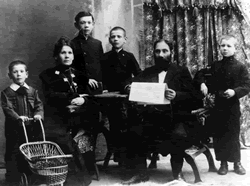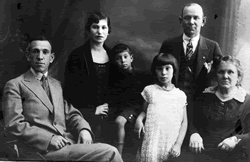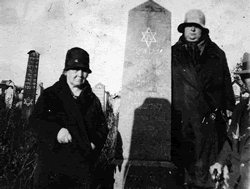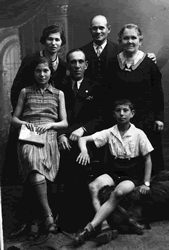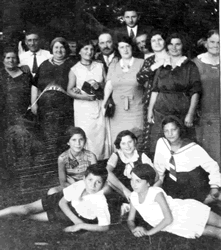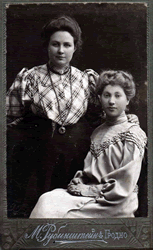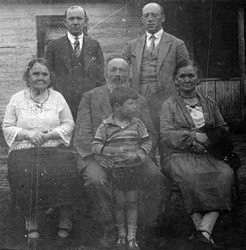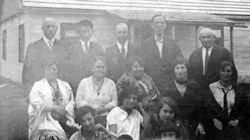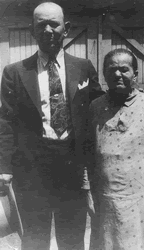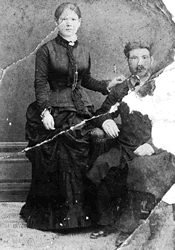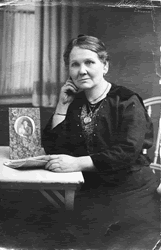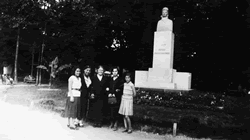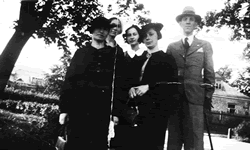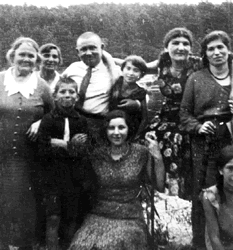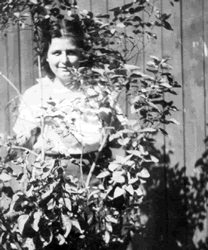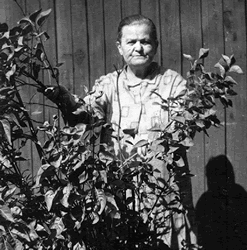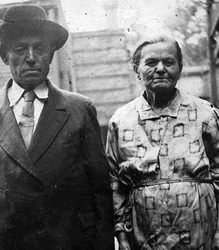Ahad Ha-am (1856-1927)
Asher Hirsch Ginsberg
It has been said that the pen is mightier than the sword. In modern Jewish history one man who really accomplished great things with his pen was Ahad Ha-am. As a writer, he definitely changed the history of the Jewish people through the many essays and articles he wrote. Ahad Ha-am lived in Odessa in Russia where he worked for a tea company, and also in London. He traveled several times to Erez Israel, and finally settled in Tel Aviv in 1921. His numerous works are now collected in four volumes called Al Parashat ha-Derakhim, which means "at the crossroads." He felt that the Jewish people stood at a crossroad in its history and undertook to point out the way which he felt was the right one. "Ahad Ha-Am" means "one of the people," and was not his real name. He was given the name Asher Hirsch Ginsberg at birth and took the pseudonym when he began to write. He wanted to show that he was really one with the Jewish people when he talked ahout matters that concerned the whole future of the nation. When Ahad Ha-Am was a young man, Jews were beginning to settle farms and villages in Palestine. An organization called Hovevei Zion ("Lovers of Zion") was urging Jews to leave Russia and establish a homeland in Erez Israel. Ahad Ha-Am joined this organization because he too believed in the goal of Zionism --- establishing a Jewish homeland. He soon visited the young settlements and then wrote his first famous essay, Lo Zeh ha-Derekh, in which he claimed that the settlements were doing very poorly and would not draw many Jews to them. Ahad Ha-Am held that the first task of Hovevei Zion must be to educate Jews so that they would want to live in Erez Israel. He felt that people would not become pioneers in a strange land where life was extremely hard if they were not especially inspired. They needed some special purpose if they were going to make that great sacrifice.
Ahad Ha-Am believed that the reason for settling in Erez Israel and for being a loyal member of the Jewish people must come from Judaism itself. In many of his essays he tried to explain what he thought the meaning of Judaism really was. He taught that Judaism had contributed some great and unique ideas to the world, of which the most important was that complete justice should be everywhere, among all men, and that Jews must try to set an example to all men by living a just life and building a good society themselves. In Erez Israel Jews who were proud of this ideal would establish a society based on honesty and justice. In such a society new life would be given to Judaism. Jewish history and culture would be studied, and teachers would go out from Israel to all areas where Jews lived. In this sense, Erez Israel would be a spiritual center of a renewed Jewish life, and would breathe this life into all the communities of the Exile. This ideal of Ahad Ha-Am was very powerful and many Zionists followed his teachings, although others opposed and fought his views.
The Department for Jewish Zionist Education
City Vilna
Photographer n/a
Description Studio portrait of the Ginsburg family. "...all now in America and the youngest girl [center, holding basket of flowers] will soon be a grandmother herself." (From "Forward' photo essay, 1932: "Striking Photographs Of The Vogues Of Yesteryear...")
#gnsb-10
David Ginzburg in Grodno son of Shevti (Zsebzel) Ginzburg and his
wife Rachel (also called Rivka). Their children were: Abraham, Asher
Moishe, Yosef, and David. Shevti died in 1920. All the children
except David emigrated to the US. David stayed in Grodno and married
Luba Weller. They had two children, Muni and Shevela. David and
Shevti Ginzburg were lawyers.I would appreciate if anyone recognizes
anybody in these pictures, they would email me. Monroe Ginsburg
monroeg@charter.net
#gnsb-11
Ferry ride, Grodno. I would appreciate if anyone recognizes anybody
in these pictures, they would email me. Monroe Ginsburg
monroeg@charter.net
#gnsb-12
David ginzburg with a Grodno militia. I would appreciate if anyone
recognizes anybody in these pictures, they would email me. Monroe
Ginsburg monroeg@charter.net
#gnsb-13
Shevti and Rachel ginzburg with their sons 1904 The pictures are
my great grandparents- Shevti (Zsebzel) Ginzburg and his wife Rachel
(also called Rivka). Their children ; Abraham, Asher Moishe, Yosef,
and David. Shevti died in 1920. All the children except David
emigrated to the US. David stayed in Grodno.
David and Shevti Ginzburg were lawyers.I would appreciate if anyone
recognizes anybody in these pictures, they would email me. Monroe
Ginsburg monroeg@charter.net
#gnsb-14
Ginzburg family 1928- Rachel, David, Luba, their 2 children, and
Asher. I would appreciate if anyone recognizes anybody in these
pictures, they
would email me. Monroe Ginsburg monroeg@charter.net
#gnsb-15
Rachel ginzburg and her sister in a Grodno cemetery. I would
appreciate if anyone recognizes anybody in these pictures, they would
email me .Monroe Ginsburg monroeg@charter.net
#gnsb-16
1934- Rachel, David, Luba, their 2 children, and Asher (man in
background is unknown). Shevti (Zsebzel) Ginzburg and his wife Rachel
(also called Rivka). Their children were: Abraham, Asher Moishe,
Yosef, and David. Shevti died in 1920. All the children except David
emigrated to the US. David stayed in Grodno and
married Luba Weller. They had two children, Muni and Shevela. All
contact with the family was lost during WW II.
I would appreciate if anyone recognizes anybody in these pictures, they
would email me.
Monroe Ginsburg monroeg@charter.net
#gnsb-17
The picture in the back of the house is of Rachel's family.
All contact with the family was lost during WW II. Thanks for your
help. Email me if you recognize someone. Monroe Ginsburg
monroeg@charter.net
#gnsb-18
Picture of Rachel Ginzburg's family. I do not know anyone in these
pictures. The picture of the mother and daughter may be the sister and
niece of Rachel. Thanks for your help. Email me if you recognize
someoneMonroe Ginsburg monroeg@charter.net .
#gnsb-19
Rachel's family. All contact with the family was lost during WW II.
Thanks for your help. Email me if you recognize someone. Monroe
Ginsburg monroeg@charter.net
#gnsb-20
Rachel's family.
the family house in Grodno- I don't recognize the
other people. All contact with the family was lost during WW II.
Thanks for your help. Email me if you recognize someone.
#gnsb-21
Man is possibly the brother of Rachel Ginsburg. Unknown
woman from the album of Monroe Ginsburg
#gnsb-22
Early photo of Shevty (Sebzel) and Rachel Ginsburg- circa
1885 from the album of Monroe Ginsburg
#gnsb-23
Rachel Ginzburg circa 1918 from the album of Monroe Ginsburg
#gnsb-24
Unknown people in Grodno park from the album of Monroe Ginsburg
#gnsb-25
Unknown people with David and Luba Ginsburg- on right from
the album of Monroe Ginsburg
#gnsb-26
Unknown people- possibly related to Luba Weller Ginsburg from
the album of Monroe Ginsburg
#gnsb-27
Unknown woman from the album of Monroe Ginsburg
#gnsb-28
Unknown woman from the album of Monroe Ginsburg
#gnsb-29
Unknown couple in Grodno from the album of Monroe Ginsburg
